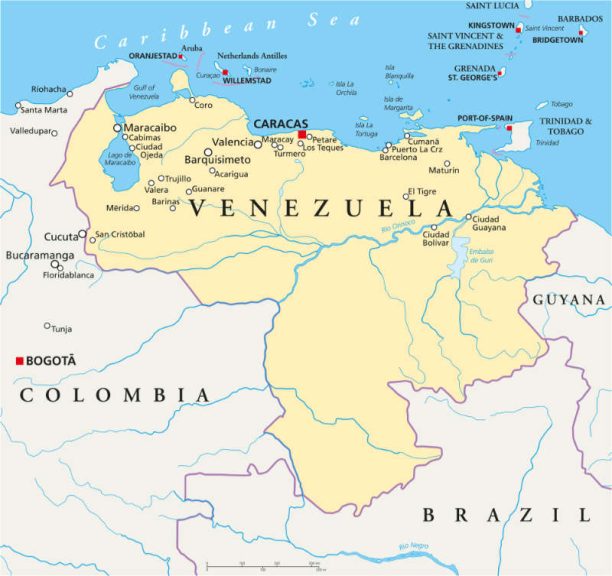On August 22, Russian Foreign Minister Sergey Lavrov had a telephone conversation with Venezuelan Executive Vice President Delcy Rodriguez Gomez.
In the course of the conversation, the two sides confirmed their mutual intention to further strengthen the strategic partnership relations between Russia and Venezuela. The parties discussed current bilateral issues and agreed to increase interaction and coordination of approaches in global affairs, including within the framework of the Group of Friends in Defense of the UN Charter.
Sergey Lavrov expressed solidarity with the Venezuelan leadership and reiterated full support for its efforts to defend national sovereignty and ensure institutional sustainability amid growing external pressure on Caracas.
On August 20, the U.S. deployed three of its Arleigh Burke-class guided-missile destroyers near the Venezuelan coast, raising fears of a military invasion. The official reason given by the Trump administration was to fight drug trafficking. The U.S. action was seen by President Nicolas Maduro as a direct threat to sovereignty. With American investments departing Venezuela, sanctions being put in place, and financial reserves frozen. President Maduro’s response has been to seek alternative trade development and investment ties with major economies such as China, India, and Russia.
Following Gomez’s phone call with Lavrov, Maduro said, “Today the executive vice president had a long and productive conversation with our close friend, Russian Foreign Minister Sergei Lavrov, who confirmed the expansion of our countries’ economic alliance and the realization of joint investment projects.”
The two countries signed a ten-year Strategic Partnership Agreement earlier this year, which outlined plans for cooperation on global and regional security and counterterrorism, setting a long-term course for deeper ties in areas including the economy, energy, investment, mineral extraction, transport, telecommunications, healthcare, and culture.
Russia is also establishing a Glonass satellite ground station in the country, allowing for improved surveillance and tracking of shipping around Venezuelan waters.

Venezuela holds the largest proven oil reserves in the world, primarily in the Orinoco Belt, and its economy is heavily reliant on the oil industry. Despite facing challenges such as underinvestment and mismanagement, oil production has started to increase, with exports reaching nearly 1 million barrels per day, primarily directed towards Asian markets.
Apart from oil, Venezuela’s industrial sector includes manufacturing activities like food processing, textiles, construction materials, and iron and steel production. The government has been working on revitalizing these industries to decrease its dependency on oil exports and encourage economic diversification. Agriculture also plays a role in the economy, contributing to both exports and domestic consumption. However, the sector faces significant challenges, including land degradation and limited access to modern technology. The services sector, covering areas like finance, tourism, and retail, is another vital contributor to Venezuela’s GDP. The country has also developed a strong presence in industries such as textiles, aeronautics, pharmaceuticals, automobiles, steel, and chemicals.
Venezuela is a member of several regional and international organizations, though its participation has been limited due to political and economic challenges. It is a founding member of the Bolivarian Alliance for the Americas (ALBA) and became a full member of Mercosur in 2012, though its membership was suspended in 2016, and it now holds observer status. Venezuela also maintains observer status in CARICOM and has bilateral trade agreements with several CARICOM members, especially in energy and trade. Additionally, Venezuela has established numerous bilateral trade agreements with Latin American and Asian countries, focusing on oil and agricultural exports. One key agreement is Petrocaribe, which facilitates preferential oil sales to Caribbean and Central American nations.
Last November, during the 18th meeting of the high-level Intergovernmental Russian-Venezuelan Commission, a Protocol on cooperation within the framework of the Eurasian Economic Union (EAEU) tariff preferences system was signed. It simplifies customs procedures for the importation of Venezuelan goods into Russia that fall under the EAEU preferential regime (importation at a 25% reduction in customs duties), which will serve as a driver for further growth of bilateral trade.
The EAEU comprises Russia, Belarus, Armenia, Kazakhstan, and Kyrgyzstan. It also has trade agreements with China and is negotiating a free trade agreement with India.
The meeting also saw the signing of new cooperation agreements on hydrocarbon production, energy, aviation, and information technology.
Venezuela is also a candidate member for the BRICS, although it faces opposition from Brazil in joining the group. However, Maduro has also warned that if US political aggression continues, he would transfer US energy contracts for Venezuela’s oil to the BRICS nations.
With a population of approximately 28.4 million people, Venezuela’s GDP (PPP) stands at US$224.5 billion, with a GDP per capita of US$8,486. Despite its economic and political challenges, the Central Bank of Venezuela reported that the national GDP grew 9.32% in the first quarter of 2025.
Bilateral trade between Venezuela and Russia has been increasing and reached about US$270 million in 2024, with a 70% increase over the previous year.
Russia has also diversified its range of exports to Venezuela by supplying high-tech goods (machine tools and equipment) and mineral products. The share of shipments of agricultural goods to the country also increased significantly. Venezuela was the third largest importer of Russian wheat in the LatAm region in 2024.
The current Venezuelan political strategy—in the face of continuing political and sanctions pressure from Washington—appears to be mirroring that of larger countries such as Brazil and India, both of whom are also ramping up their trade and investment ties within the BRICS bloc as an antidote to the erratic and unreliable, and in Venezuela’s case, unfriendly trade relations with the United States.
Further Reading

 Русский
Русский














